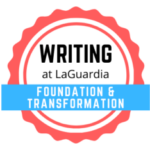-

Introduction to Multilingualism in College Composition for Students by Ting Man Tsao
“Introduction to Multilingualism in ENA and ENG 101” by Ting Man Tsao Letter of Welcome & Introduction to Multilingualism in ENA 101 by Ting Man Tsao Hi, How are you? 你好吗 Nǐ hǎo? 你好嗎? This is Dr. Tsao of the English Department. Welcome to our first composition class at LaGuardia! The LaGuardia community is linguistically…
|
-

Tips for Working Toward a Multilingual Paradigm by Ting Man Tsao
1) As Lucy, Joy, and Evelyn remind us, adopting a multilingual paradigm “involves a shift in perspective and a willingness to engage in learning ourselves.” So begin by trying out one or two low-stakes multilingual activities or assignments. As we gain more experience, add or modify more activities or assignments. Don’t overwhelm ourselves by overhauling…
|
-

Dictionary Exercises & Reflection by Ting Man Tsao
1) After reading the handout “Using Dictionaries for Writing,” look up this word “exploratory” in the Cambridge Dictionary. Try and use different options and features in the dictionary to find the following information of the word (put your answers below): ⭐ meanings: ⭐ examples of the use of the word: ⭐ translations in a language…
|
-

Working Towards a Multilingual Paradigm: Using Dictionaries for Writing* (Activity) by Ting Man Tsao
A dictionary is a very useful tool for writing. With a good dictionary you can do the following: 1) Look up the meaning of an English word. But a word often has more than one meaning so do not just look at the first definition in the dictionary entry. For example, the Cambridge Dictionary online…
|
-

Working Towards a Multilingual Paradigm: Attitudes Toward Language*(Activity) by Ting Man Tsao
1) Is it important to you to master your native language or dialect? Explain. 2) Should children master their parents’ native language? Explain. 3) If you are not a native English speaker, do you think your own native language and culture will help you develop your skills in English composition? Explain. 4) Is it important…
|
-

Working Towards a Multilingual Paradigm: Student Questionnaire on Language Background* (Activity) by Ting Man Tsao
1) Name: 2) Education (degree obtained or school level attended): 3) Country of origin: 4) Country of residence: 5) If questions 3 and 4 are different, how long have you been in the country of your current residence? 6) What is your native language or languages? At what age did you begin to learn each?…
|
-

Working Toward a Multilingual Paradigm: An Introduction for Faculty by Ting Man Tsao
Located at linguistically diverse Queens, LaGuardia Community College boasts an equally linguistically diverse student body as the above word clouds show (Nagano, Tables 1 & 2). According to the college’s Institutional Profile, 56% of students are non-native born; they come from 158 countries and speak 89 languages (Office of Institutional Research & Assessment). What is…
|
-

Introduction to Self-Editing for Students by Lauren Navarro
“A Guide to “Glow Up” Your Writing” narrated by Lauren Navarro (Video) Click below to download the “A Guide to “Glow Up” Your Writing” narrated by Lauren Navarro (PowerPoint)
|
-

Self-Editing: Loud and Proud by Suzanne Uzzilia
Loud and Proud (Read Your Work Aloud) Note to Instructor: This assignment aligns with Step Three: Read Your Work Aloud (Slide 7 of “Revision and Self-Editing in ENA 101: A Guide to ‘Glow Up’ Your Writing” by Lauren Navarro, adapted from “7 Steps to a Foolproof Revision” by Don Fry). Assignment: While your instructors will…
|
-

Self-Editing: Enlisting a Second Reader by Suzanne Uzzilia
Enlist a Second Reader (Writing Center) Note to Instructor: This assignment aligns with Step Seven: Enlist a Second Reader (Or More)! (Slide 11 of “Revision and Self-Editing in ENA 101: A Guide to ‘Glow Up’ Your Writing” by Lauren Navarro, adapted from “7 Steps to a Foolproof Revision” by Don Fry). It is also an…
|
-

Introduction to Self-Editing for Faculty by Suzanne Uzzilia
Self-Editing Overview “We want them to leave our classrooms able to function as competent self-editors, able tocontinue their growth as writers as they incorporate new strategies into their practice. Weenvision for them lifelong success extending their abilities to communicate meaningfully withthe written word without tripping unacceptably over mechanical conventions.” (“IndependentRepatterning: Developing Self-Editing Competence” by Kathleen…
|


